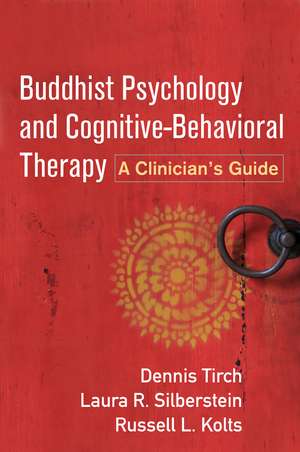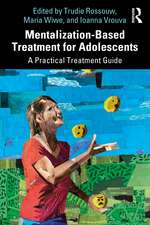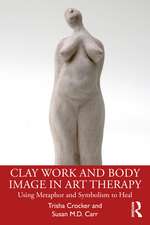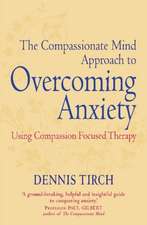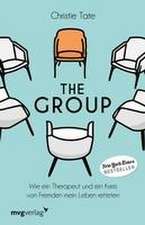Buddhist Psychology and Cognitive-Behavioral Therapy: A Clinician's Guide
Autor Dennis Tirch, Laura R. Silberstein-Tirch, Russell L. Koltsen Limba Engleză Paperback – 12 ian 2017
This user-friendly guide to the basics of Buddhist psychology presents a roadmap specifically designed for cognitive-behavioral therapy (CBT) practitioners. It explains central Buddhist concepts and how they can be applied to clinical work, and features numerous experiential exercises and meditations. Downloadable audio recordings of the guided meditations are provided at the companion website. Essential topics include the relationship between suffering and psychopathology, the role of compassion in understanding and treating psychological problems, and how mindfulness fits into evidence-based psychotherapy practice. The book describes an innovative case conceptualization method, grounded in Buddhist thinking, that facilitates the targeted delivery of specific CBT interventions.
Preț: 211.56 lei
Preț vechi: 222.69 lei
-5% Nou
Puncte Express: 317
Preț estimativ în valută:
40.48€ • 42.32$ • 34.21£
40.48€ • 42.32$ • 34.21£
Carte disponibilă
Livrare economică 13-27 februarie
Livrare express 29 ianuarie-04 februarie pentru 24.57 lei
Preluare comenzi: 021 569.72.76
Specificații
ISBN-13: 9781462530199
ISBN-10: 1462530192
Pagini: 266
Dimensiuni: 152 x 229 x 22 mm
Greutate: 0.4 kg
Ediția:1
Editura: Guilford Publications
Colecția Guilford Press
ISBN-10: 1462530192
Pagini: 266
Dimensiuni: 152 x 229 x 22 mm
Greutate: 0.4 kg
Ediția:1
Editura: Guilford Publications
Colecția Guilford Press
Public țintă
Professional and Professional Practice & DevelopmentCuprins
Foreword, Robert L. Leahy
1. Introduction to the Functional Relationship between Buddhist Psychology and CBT
2. The Foundational Elements of Buddhist Psychology
3. The Middle Path and Adaptive Conduct
4. The Middle Path, Mental Discipline, and Wisdom
5. Mindfulness as a Foundation in Buddhist Psychology and CBT
6. Mindfulness as a Context for the Cultivation of Compassion
7. Cultivating the Compassionate Mind in Buddhist Psychology and CBT
8. Behavioral Bodhisattvas: Systematic Compassion Interventions
9. Deeper into the Middle Path Evidence Base
10. The Question of Enlightenment and Case Formulation
Appendix. Foundational Elements of Buddhist Psychology
1. Introduction to the Functional Relationship between Buddhist Psychology and CBT
2. The Foundational Elements of Buddhist Psychology
3. The Middle Path and Adaptive Conduct
4. The Middle Path, Mental Discipline, and Wisdom
5. Mindfulness as a Foundation in Buddhist Psychology and CBT
6. Mindfulness as a Context for the Cultivation of Compassion
7. Cultivating the Compassionate Mind in Buddhist Psychology and CBT
8. Behavioral Bodhisattvas: Systematic Compassion Interventions
9. Deeper into the Middle Path Evidence Base
10. The Question of Enlightenment and Case Formulation
Appendix. Foundational Elements of Buddhist Psychology
Notă biografică
Dennis Tirch, PhD, is Director of the Center for Compassion Focused Therapy in New York City and Adjunct Clinical Assistant Professor in the Department of Psychiatry at Weill Cornell Medical College. He is an associate editor of the Journal of Contextual Behavioral Science and president of the Compassionate Mind Foundation USA, which is committed to research and training in compassion-focused therapy (CFT). Dr. Tirch serves as president of the New York City Cognitive-Behavioral Therapy (CBT) Association and president emeritus of the New York City chapter of the Association for Contextual Behavioral Science, and is a Diplomate and Fellow of the Academy of Cognitive and Behavioral Therapies. He provides training internationally for clinicians and researchers and is the author of numerous books, chapters, and peer-reviewed articles on CBT, CFT, acceptance and commitment therapy, and Buddhist psychology principles.
Laura R. Silberstein-Tirch, PsyD, is Associate Director of the Center for Compassion Focused Therapy and a consulting psychologist at Memorial Sloan Kettering Cancer Center in New York City. She is also Adjunct Assistant Professor at Albert Einstein College of Medicine of Yeshiva University. Dr. Silberstein is a clinical supervisor and compassion-focused therapy (CFT) trainer who presents internationally on mindfulness and compassion and is coauthor (with Dennis Tirch and Benjamin Schoendorff) of The ACT Practitioner's Guide to the Science of Compassion. She is a founder and executive board member of the New York City chapter of the Association for Contextual Behavioral Science and the Compassionate Mind Foundation USA. Her research interests include psychological flexibility and emotions as well as CFT for anxiety and depression.
Russell L. Kolts, PhD, is Professor of Psychology at Eastern Washington University. Dr. Kolts has authored or coauthored numerous scholarly articles and books, including An Open-Hearted Life: Transformative Lessons for Compassionate Living from a Clinical Psychologist and a Buddhist Nun (with Thubten Chodron). Dr. Kolts has pioneered the application of compassion-focused therapy (CFT) to the treatment of problematic anger. He regularly conducts trainings and workshops on CFT and is a board member of the Compassionate Mind Foundation USA.
Laura R. Silberstein-Tirch, PsyD, is Associate Director of the Center for Compassion Focused Therapy and a consulting psychologist at Memorial Sloan Kettering Cancer Center in New York City. She is also Adjunct Assistant Professor at Albert Einstein College of Medicine of Yeshiva University. Dr. Silberstein is a clinical supervisor and compassion-focused therapy (CFT) trainer who presents internationally on mindfulness and compassion and is coauthor (with Dennis Tirch and Benjamin Schoendorff) of The ACT Practitioner's Guide to the Science of Compassion. She is a founder and executive board member of the New York City chapter of the Association for Contextual Behavioral Science and the Compassionate Mind Foundation USA. Her research interests include psychological flexibility and emotions as well as CFT for anxiety and depression.
Russell L. Kolts, PhD, is Professor of Psychology at Eastern Washington University. Dr. Kolts has authored or coauthored numerous scholarly articles and books, including An Open-Hearted Life: Transformative Lessons for Compassionate Living from a Clinical Psychologist and a Buddhist Nun (with Thubten Chodron). Dr. Kolts has pioneered the application of compassion-focused therapy (CFT) to the treatment of problematic anger. He regularly conducts trainings and workshops on CFT and is a board member of the Compassionate Mind Foundation USA.
Recenzii
"Since the emergence of CBT approaches emphasizing mindfulness, acceptance, and compassion, this book has been crying out to be written. It is unique in offering a detailed and thoughtful analysis of the relationship between Western psychological science and Buddhism’s clear-eyed, sophisticated theory of mind and transformative practices. Lucidly written, the book is enlivened by engaging clinical examples and experiential exercises. This is essential reading for anyone seeking a deeper understanding of the ancient tradition that shapes evolving psychological approaches to the relief of suffering."--Melanie Fennell, PhD, Oxford Mindfulness Centre, Department of Psychiatry, University of Oxford, United Kingdom
"Make no mistake, this book is not just for Buddhists. The authors provide an articulate overview of Buddhist teachings and their consistency with CBT theory and techniques. Behaviorists will recognize the emphasis on the function of behavior in context, and CBT practitioners will feel at home with the idea that one’s reaction to events--rather than events themselves--are at the root of suffering. I wholeheartedly recommend this book to beginning students or seasoned clinicians to gain further insight into what really matters in our work with clients, and see afresh client experiences that should be the focus of intervention. Unlike many clinical guides, the exercises allow the reader to enhance self-compassion while learning more about providing compassionate help to others."--Christopher R. Martell, PhD, ABPP, Clinic Director, Psychological Services Center, University of Massachusetts, Amherst
"This wonderful book should be read by everyone interested in contemporary psychotherapy. It clearly elucidates powerful insights from the rich Buddhist psychological tradition, which help to expand our understanding of third-wave therapies and have value for any psychotherapist. Masterfully crafted guided exercises and reflections give readers a direct experience of the concepts presented. The authors are to be congratulated for their succinct explication and contextualization of Buddhist psychology and its relevance for clinical practice. This is a superb book that offers both practical tools and a scholarly understanding of how we might all work better with our patients' and our own suffering, and cultivate positive emotions and mind states."--Susan E. Abbey, MD, FRCPC, Psychiatrist-in-Chief, Centre for Mental Health; Professor, Department of Psychiatry, University of Toronto, Canada
"A 'must read' for CBT practitioners who seek grounding in Buddhist theory as it applies to contemporary psychology. The authors do a very nice job of mapping Buddhist philosophical principles onto the tenets of third-wave therapies. Clinical examples and real-life applications of mindfulness are peppered throughout the book; the audio downloads at the companion website are an added bonus. Readers will surely find helpful additions for their therapeutic toolboxes."--M. Kathleen B. Lustyk, PhD, Department of Psychology, Seattle Pacific University
-This book presents an introduction to the concepts of Buddhism for mental health clinicians, especially regarding mindfulness and compassion. It assumes a working knowledge of cognitive-behavioral therapy, and would be a useful tool for CBT therapists looking to incorporate these precepts into their practice….This book presumes that the reader has little prior knowledge of Buddhism, however. This makes it an excellent resource for the Christian clinician, who may not already be familiar with Buddhism as a faith. However, many of the concepts are relatable to the Christian faith, such as the importance of compassion….[The] organization makes the book easy to digest either as a complete read, or in sections.--Journal of Psychology and Christianity, 12/1/2016ƒƒFrom the onset, the discourse focuses on the functional relationship between Buddhist psychology and CBT, hence providing a clear, informative, practical, and accessible guide to applying Buddhist principles to the scientifically tried and tested processes and procedures to predict and influence human behavior. As such, the authors effectively illustrate that evidence-based psychotherapies provide a suitable platform to add new possibilities of improvement for the clinician. The book is essentially a practical roadmap for cognitive-behavioral practitioners and features numerous clinical vignettes, experiential exercises, and guided meditations that can be applied to clinical work and assist practitioners in improving their delivery….The authors conclude with a final overarching clinical example of how to apply the four noble truths and seven factors of enlightenment in a case conceptualization. Each aspect is considered in turn and placed in the context of the client's needs, characteristics, and situation and then reconciled with available CBT tools and techniques. What an effective and powerful way to illustrate the integration of Buddhism and psychology one final time! Overall, the text is certainly one of the, if not the, leading works of the hands-on integration of traditional Buddhist concepts into the clinical practices of modern Western psychotherapy.--PsycCRITIQUES, 5/9/2016"Make no mistake, this book is not just for Buddhists. The authors provide an articulate overview of Buddhist teachings and their consistency with CBT theory and techniques. Behaviorists will recognize the emphasis on the function of behavior in context, and CBT practitioners will feel at home with the idea that one’s reaction to events--rather than events themselves--are at the root of suffering. I wholeheartedly recommend this book to beginning students or seasoned clinicians to gain further insight into what really matters in our work with clients, and see afresh client experiences that should be the focus of intervention. Unlike many clinical guides, the exercises allow the reader to enhance self-compassion while learning more about providing compassionate help to others."--Christopher R. Martell, PhD, ABPP, Clinic Director, Psychological Services Center, University of Massachusetts, Amherst
"For those who wish to go deeper into the foundations of mindfulness, this practitioner guide provides an approachable analysis of its Buddhist underpinnings. It provides psychotherapists with the tools to conceptualize clinical practice from both CBT and Buddhist perspectives."--Beverly E. Thorn, PhD, ABPP, Department of Psychology (Emerita), University of Alabama
"This wonderful book should be read by everyone interested in contemporary psychotherapy. It clearly elucidates powerful insights from the rich Buddhist psychological tradition, which help to expand our understanding of third-wave therapies and have value for any psychotherapist. Masterfully crafted guided exercises and reflections give readers a direct experience of the concepts presented. The authors are to be congratulated for their succinct explication and contextualization of Buddhist psychology and its relevance for clinical practice. This is a superb book that offers both practical tools and a scholarly understanding of how we might all work better with our patients' and our own suffering, and cultivate positive emotions and mind states."--Susan E. Abbey, MD, FRCPC, Psychiatrist-in-Chief, Centre for Mental Health; Professor, Department of Psychiatry, University of Toronto, Canada
"A 'must read' for CBT practitioners who seek grounding in Buddhist theory as it applies to contemporary psychology. The authors do a very nice job of mapping Buddhist philosophical principles onto the tenets of third-wave therapies. Clinical examples and real-life applications of mindfulness are peppered throughout the book; the audio downloads at the companion website are an added bonus. Readers will surely find helpful additions for their therapeutic toolboxes."--M. Kathleen B. Lustyk, PhD, Department of Psychology, Seattle Pacific University
Descriere
This user-friendly guide to the basics of Buddhist psychology presents a roadmap specifically designed for cognitive-behavioral therapy (CBT) practitioners. It explains central Buddhist concepts and how they can be applied to clinical work, and features numerous experiential exercises and meditations. Downloadable audio recordings of the guided meditations are provided at the companion website. Essential topics include the relationship between suffering and psychopathology, the role of compassion in understanding and treating psychological problems, and how mindfulness fits into evidence-based psychotherapy practice. The book describes an innovative case conceptualization method, grounded in Buddhist thinking, that facilitates the targeted delivery of specific CBT interventions.
